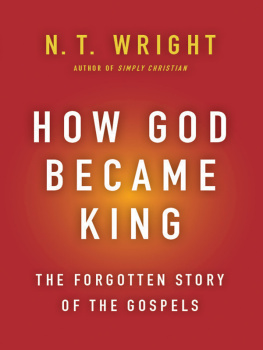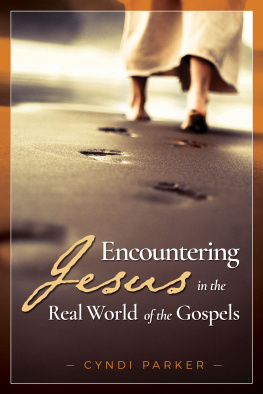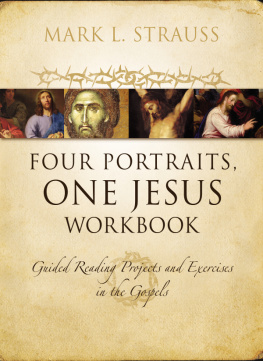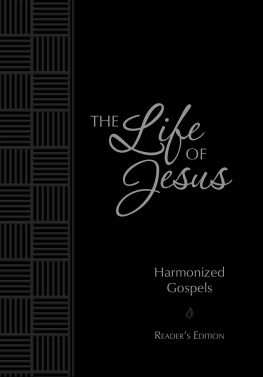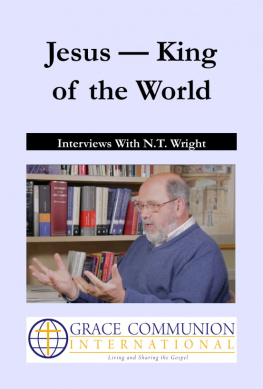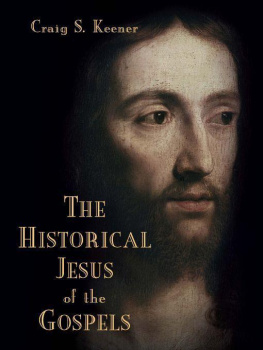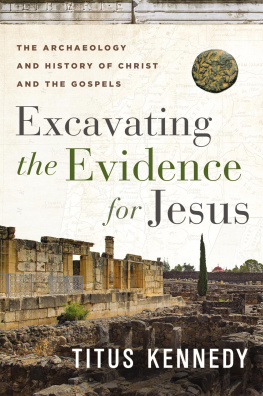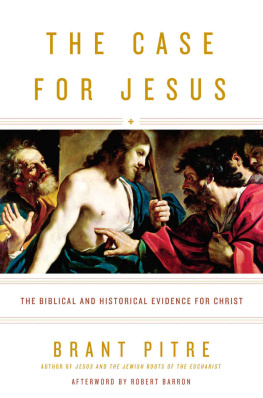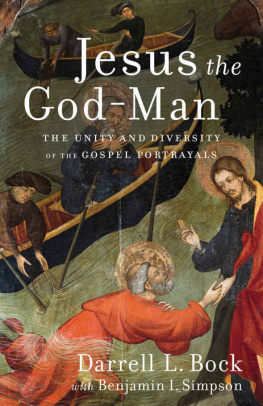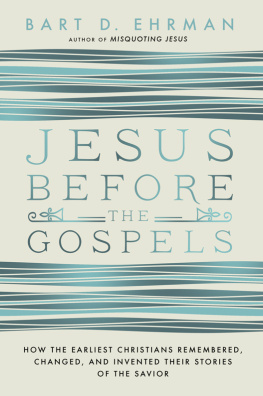St. Marys College,
St. Andrews
I T HAS BEEN slowly dawning on me over many years that there is a fundamental problem deep at the heart of Christian faith and practice as I have known them. This problem can be summarized quite easily: we have all forgotten what the four gospels are about . Yes, theyre about Jesus, but what exactly are they saying about Jesus? Yes, theyre about God, but what precisely are they saying about God? Yes, theyre about the beginnings of what later became known as Christianity, but what are they saying about that strange new movement, and how do they resource it for its life and work?
As I have both studied and written about Jesus and the gospels, and as I have tried to lead and teach Christian communities that were doing their best to follow Jesus and order their lives by the gospels, I have had the increasing impression, over many years now, that most of the Western Christian tradition has simply forgotten what the gospels are really all about. Despite centuries of intense and heavy industry expended on the study of all sorts of features of the gospels, we have often managed to miss the main thing that they, all four of them, are most eager to tell us. I have therefore come to the conclusion that what we need is not just a bit of fine-tuning, an adjustment here and there. We need a fundamental rethink about what the gospels are trying to say, and hence about how best we should read them, together and individually. Andnot leastabout how we then might order our life and work in accordance with them.
The problem of forgetting what the gospels are about is not confined to one segment of the church. Different branchesCatholic, Protestant, Reformed, charismatic, evangelical, liberal, social-gospel, and the many segments of church life that bear two or more of these rather misleading labels at the same timecome at things from different angles. Naturally. But it is my belief that all of them, over many centuries now, have backed off from facing the full challenge of Matthew, Mark, Luke, and John. It would be fascinating to chart the ways in which different parts of the church have read (and, in my view, misread) the gospels. But that would require a different sort of book and is in any case way beyond my competence.
Instead, I want to come at the question from the angle of the parts of the church I know best. After nearly twenty years in senior ministerial roles in the Church of England, seven of them as Bishop of Durham, and with fairly wide experience of traditions very different from my own, I think what I have to say reflects not a narrow or idiosyncratic viewpoint, but one at which many Christians from many traditions will nod with recognition. The question, then, is not only: Can we learn to read the gospels better, more in tune with what their original writers intended? It is also: Can we discover, by doing this, a new vision for Gods mission in the world, in and through Jesus, and thennow!in and through his followers? And, in doing so, can we grow closer together in mission and life, in faith and hope, and even in love? Might a fresh reading of the gospels, in other words, clear the way for renewed efforts in mission and unity? Is that what it would look like if we really believed that the living God was king on earth as in heaven?
That, after all, is the story all four gospels tell. I am aware, of course, that there are other documents that have been called gospels, and I shall say something about them in passing. But I am here dealing with the four that were recognized, from very early on, as part of the churchs rule of life, that is, part of the canon: Matthew, Mark, Luke, and John. And the story that the four evangelists tell is the story, as in my title, of how God became king.
This, I discover, comes as a surprise to most people, and an unwelcome shock to some. It appears, as we say today, counterintuitive; that is, the claim that God has become king doesnt seem to square with the world as we know it. If God is really king, why is there still cancer? Why are there still tsunamis? Why are there still tyranny, genocide, child abuse, and massive economic corruption? Whats more, as we shall see, some people, not least some Christians, appear allergic to the very idea of God becoming, or being, king. Isnt God as king triumphalist? Doesnt that lead us toward that dreaded word theocracy? And isnt that one of the problems of our day, not one of the solutions?
Questions like that are important. But even if the gospel writers had heard us asking them, they would not have backed off from the claim they were making. To discover why not and to see what they might have said in reply to such comments, we have to take a deep breath and go back to the beginning.
The book proceeds in four parts, or stages. Part I introduces the problem as I see it and attempts to sharpen it up, so that readers come to see that there really is a problem that demands some fresh work and, if possible, some fresh attempts at a solution. The second part explores four dimensions of the canonical gospels that, again, have normally been screened out in modern Western readings and that we need to recover if we are to allow the gospels to tell us the story they intend to tell. Then, in Part III, we reach what is really the heart of the picture. Using the four dimensions set out in the second part, I try to show how the two vital themes so often separated, the kingdom and the cross, come together in the gospels, knock sparks off one another, and reinforce each other in setting out a claim that todays church has all but forgotten, a claim as much in what we call the political as in what we call the religious or spiritual sphere. That central combination of kingdom and cross then leads to further considerations about the meaning of these themes in the light of the gospels story of Jesuss resurrection and ascension.
Then, in the final part, I come back to the great creeds and suggest that, though we have indeed allowed them to lull us into a frame of mind in which its all too easy to screen out the central message of the gospels, it is just as possible, once we realize that mistake, to say or sing them as rich affirmations of that full message. This will generate some suggestions about how we should rethink our basic traditions of teaching and practice, so as to be more faithful to the documents that are, after all, at the heart of the Christian faith.
It may be worth pointing out at this introductory stage that this book is not primarily about Jesus himself. I have written plenty on Jesus within his historical context, including a recent short book, Simply Jesus . and similar books.) Why did Matthew, Mark, Luke, and John do it in the ways they did?
In case anyone should think at this point that I am simply lumping the four canonical gospels together without paying proper attention to their very considerable differences, let me say right away that, though these four share a great deal with one another that is not shared with the noncanonical gospels, in other ways they are just as different from one another as they are from those other traditions. Within the quartet itself, of course, a similar point is to be made. Matthew, Mark, and Luke are much more like one another than any of them is like John, but they are still very different works. But my question is: What story is it they are trying to tell?

